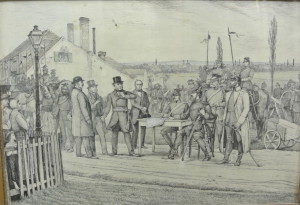On 27 January 2017, Chris Millington (Swansea) led a one-day workshop at the Institute of Historical Research funded by the British Academy where doctoral and early career French historians met to discuss their research and approaches to teaching. Organised in conjunction with the French History Network and New Directions workshops, it showcased the work of six doctoral researchers exploring various of modern French history.
In the first panel, Alexandra Paulin-Booth (Oxford) and Will Clement (Oxford) explored time and space in France. The papers – ‘Capturing the future: time and radical political movements in the Belle Époque’ and ‘Building, shaping, and understanding the working-class home in nineteenth-century France’ respectively – discussed how ideas of time and space were debated, used and reshaped in nineteenth-century and early twentieth-century France. Crucially, they brought home the importance of concepts of time and space for historians. The session was recorded so you can enjoy them in your lunch hour here.
ALEXANDRA PAULIN-BOOTH on ‘Capturing the future: time and radical political movements in the Belle Époque’: This paper was about visions of society and ideas about the future among radical political thinkers in France, roughly between the years 1889–1910. In order to explore this theme, I focussed on three futurist novels published by political thinkers and activists around the turn of the century, asking how much they can help us understand about how the future was envisaged and conceptualised in certain political milieu. These were nationalist Maurice Spronck’s L’an 330 de la République (1894), then-socialist Daniel Halévy’s Histoire des quatre ans (1903), and leftwing novelist Anatole France’s Sur la pierre blanche (1905). I also illustrated how these novels fit into the ‘utopian’ or futurist genre across the longer term.

WILL CLEMENT on ‘Building, shaping, and understanding the working-class home in nineteenth-century France’: As I was at the beginning of my writing-up process, I was grateful for the opportunity to get feedback from my peers at the IHR seminar on the structure of my thesis, as well as on the motivations behind my engagement with the topic. Frequently, work on the history of housing in France is skewed both temporally to the series of state legislation at the turn of the twentieth century and/or geographically to an overwhelming focus on the capital of Paris. By taking the three textile towns of Lyon, Mulhouse, and Roubaix in the period c. 1850-75 as subjects of comparison, my thesis will decentre this narrative of a state-centric progression towards social housing. As well as showing the variety of local interactions to the ‘housing problem’, this thesis also contributes to comparative history and to the history of provincial French elites. This IHR paper begins with a vignette of a Mulhousian industrialist placing himself between Prussian cannons and his innovative housing scheme, before tracing the methodological and structural elements of my thesis.

BIOs:
Alexandra Paulin-Booth is a Lecturer in Modern European and World History at Balliol College, Oxford, and is preparing her doctoral thesis for submission later this summer. Before moving to Oxford in 2012, she completed an interdisciplinary undergraduate degree (in English literature, French literature, and history) and an MA in Modern History at Durham. Paulin-Booth’s work explores understandings of time among radical political movements in France between the Dreyfus Affair and the First World War. Socialists, syndicalists, nationalists, anarchists—all these groups developed particular cultures of time which informed their political missions. Her work seeks to highlight the significance of varying conceptions of time for the political culture of Belle Époque France, as well as to make a broader contribution by demonstrating the importance of thinking about time as a category for historical analysis.
Will Clement is a third-year History DPhil student at St John’s, Oxford, having previously studied at Pembroke College, Oxford and Durham University. He works on nineteenth-century French urban and social history. Since 2015, he has worked as a postgraduate representative for the Society for the Study of French History, and is currently in the writing-up stages of his thesis on working-class housing in three French textile towns.


